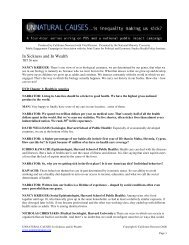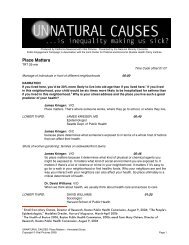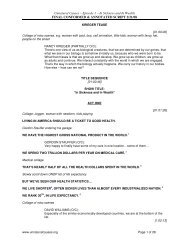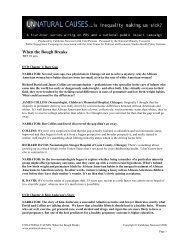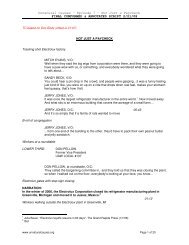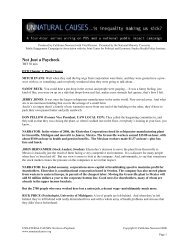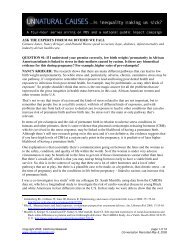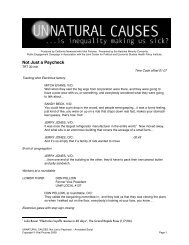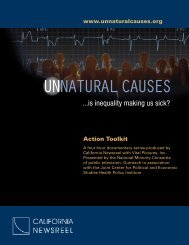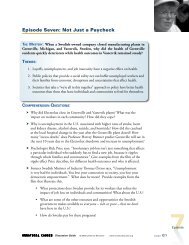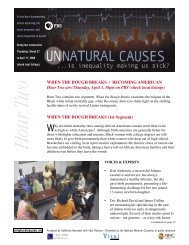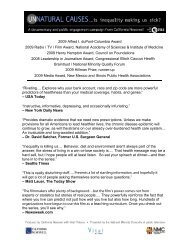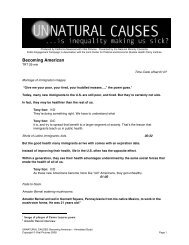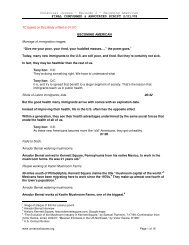Episode Three: Becoming American - Unnatural Causes
Episode Three: Becoming American - Unnatural Causes
Episode Three: Becoming American - Unnatural Causes
Create successful ePaper yourself
Turn your PDF publications into a flip-book with our unique Google optimized e-Paper software.
Epidemiologist Lisa Berkman says: “Overall, people who are really isolated are at increased risk<br />
not only for cardiovascular disease, but for infectious diseases, for diabetes, for strokes, for cancer.<br />
They were at increased risk from almost every cause of death.”<br />
• What are the causes of social isolation and exclusion in America<br />
• Why are <strong>American</strong>s on average more socially isolated today than 20 years ago<br />
• How does a strong community network support social inclusion<br />
Di s c u s s i o n Qu e s t i o n s:<br />
Dr. Iton says, “When you’re a new immigrant, the relationship between wealth and health is<br />
relatively loose. As you become more <strong>American</strong>, that relationship becomes tighter and tighter<br />
and tighter.” What does he mean<br />
• What forces in society cause the tightening of that relationship<br />
• What interventions might prevent this from happening<br />
• What can we learn from immigrants that can help improve health for all <strong>American</strong>s<br />
Amador Bernal says: “I water the mushrooms with a hose and watering can by myself… I earn<br />
$9.03 an hour. I work 8 hours a day, 7 days a week.”<br />
• How does economic need influence the Bernals’ ability to parent their children<br />
• How do economic circumstances influence the children’s ability to succeed at school<br />
• What steps can a community take to support parent-child bonds and increase the chances<br />
for all children to succeed in school<br />
The film notes that workers at the mushroom farm get no paid sick days and that the U.S.<br />
is alone among wealthy nations in not legislating paid sick leave. In your view, what are the<br />
consequences for working families in America of not having paid sick days How would families<br />
benefit if these were guaranteed by law for everyone<br />
According to the film, three out of four <strong>American</strong>s who were at the bottom of the income ladder<br />
in the late 1980s were still there a decade later. What conditions limit economic mobility How<br />
do current U.S. economic and labor policies “stack the deck” for or against working families<br />
In describing neglected neighborhoods, Dr. Iton says that if your “environment is giving you<br />
cues that you’re not valuable, that you have little prospects for a good future, that starts to<br />
build up and you internalize that devaluation.” What specific things about a neighborhood can<br />
make one feel valued or devalued How might resources be allocated so that people from every<br />
neighborhood in your city or town can feel valued<br />
The film reports that social isolation is on the rise in the U.S. What are the causes of social<br />
isolation What efforts or opportunities exist in your community to decrease social isolation and<br />
provide members with a sense of belonging and connection What might be done to strengthen,<br />
sustain, or expand those efforts<br />
<strong>Episode</strong> <strong>Episode</strong><br />
<strong>Episode</strong><br />
<strong>Unnatural</strong> <strong>Causes</strong> Discussion Guide © 2008 California Newsreel www.unnaturalcauses.org<br />
page C2



